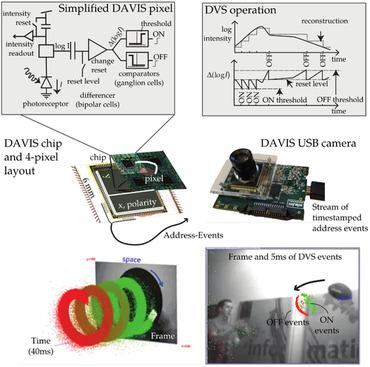Search Results for author: Qinghai Guo
Found 18 papers, 6 papers with code
When in Doubt, Think Slow: Iterative Reasoning with Latent Imagination
no code implementations • 23 Feb 2024 • Martin Benfeghoul, Umais Zahid, Qinghai Guo, Zafeirios Fountas
In an unfamiliar setting, a model-based reinforcement learning agent can be limited by the accuracy of its world model.
Sample as You Infer: Predictive Coding With Langevin Dynamics
no code implementations • 22 Nov 2023 • Umais Zahid, Qinghai Guo, Zafeirios Fountas
We present a novel algorithm for parameter learning in generic deep generative models that builds upon the predictive coding (PC) framework of computational neuroscience.
Weakly-Supervised Action Localization by Hierarchically-structured Latent Attention Modeling
no code implementations • ICCV 2023 • Guiqin Wang, Peng Zhao, Cong Zhao, Shusen Yang, Jie Cheng, Luziwei Leng, Jianxing Liao, Qinghai Guo
To address this problem, we propose a novel attention-based hierarchically-structured latent model to learn the temporal variations of feature semantics.
Automotive Object Detection via Learning Sparse Events by Spiking Neurons
no code implementations • 24 Jul 2023 • Hu Zhang, Yanchen Li, Luziwei Leng, Kaiwei Che, Qian Liu, Qinghai Guo, Jianxing Liao, Ran Cheng
Traditional object detection techniques that utilize Artificial Neural Networks (ANNs) face challenges due to the sparse and asynchronous nature of the events these sensors capture.
Cross-Inferential Networks for Source-free Unsupervised Domain Adaptation
no code implementations • 29 Jun 2023 • Yushun Tang, Qinghai Guo, Zhihai He
Our main idea is that, when we adapt the network model to predict the sample labels from encoded features, we use these prediction results to construct new training samples with derived labels to learn a new examiner network that performs a different but compatible task in the target domain.
Accurate and Efficient Event-based Semantic Segmentation Using Adaptive Spiking Encoder-Decoder Network
no code implementations • 24 Apr 2023 • Rui Zhang, Luziwei Leng, Kaiwei Che, Hu Zhang, Jie Cheng, Qinghai Guo, Jiangxing Liao, Ran Cheng
Leveraging the low-power, event-driven computation and the inherent temporal dynamics, spiking neural networks (SNNs) are potentially ideal solutions for processing dynamic and asynchronous signals from event-based sensors.
Predictive Coding as a Neuromorphic Alternative to Backpropagation: A Critical Evaluation
no code implementations • 5 Apr 2023 • Umais Zahid, Qinghai Guo, Zafeirios Fountas
Backpropagation has rapidly become the workhorse credit assignment algorithm for modern deep learning methods.
Curvature-Sensitive Predictive Coding with Approximate Laplace Monte Carlo
no code implementations • 9 Mar 2023 • Umais Zahid, Qinghai Guo, Karl Friston, Zafeirios Fountas
In part, this has been due to the poor performance of models trained with PC when evaluated by both sample quality and marginal likelihood.
Neuro-Modulated Hebbian Learning for Fully Test-Time Adaptation
no code implementations • CVPR 2023 • Yushun Tang, Ce Zhang, Heng Xu, Shuoshuo Chen, Jie Cheng, Luziwei Leng, Qinghai Guo, Zhihai He
We observe that the performance of this feed-forward Hebbian learning for fully test-time adaptation can be significantly improved by incorporating a feedback neuro-modulation layer.
Long-horizon video prediction using a dynamic latent hierarchy
no code implementations • 29 Dec 2022 • Alexey Zakharov, Qinghai Guo, Zafeirios Fountas
The task of video prediction and generation is known to be notoriously difficult, with the research in this area largely limited to short-term predictions.
Self-Supervised Learning Through Efference Copies
1 code implementation • 17 Oct 2022 • Franz Scherr, Qinghai Guo, Timoleon Moraitis
Specifically, the brain also transforms the environment through efference, i. e. motor commands, however it sends to itself an EC of the full commands, i. e. more than a mere SSL sign.
Hebbian Deep Learning Without Feedback
1 code implementation • 23 Sep 2022 • Adrien Journé, Hector Garcia Rodriguez, Qinghai Guo, Timoleon Moraitis
Recent approximations to backpropagation (BP) have mitigated many of BP's computational inefficiencies and incompatibilities with biology, but important limitations still remain.
Modelling non-reinforced preferences using selective attention
no code implementations • 25 Jul 2022 • Noor Sajid, Panagiotis Tigas, Zafeirios Fountas, Qinghai Guo, Alexey Zakharov, Lancelot Da Costa
These memories are selectively attended to, using attention and gating blocks, to update agent's preferences.
Short-Term Plasticity Neurons Learning to Learn and Forget
1 code implementation • 28 Jun 2022 • Hector Garcia Rodriguez, Qinghai Guo, Timoleon Moraitis
Its key mechanism is that synapses have a state, propagated through time by a self-recurrent connection-within-the-synapse.
Discrete Time Convolution for Fast Event-Based Stereo
1 code implementation • CVPR 2022 • Kaixuan Zhang, Kaiwei Che, JianGuo Zhang, Jie Cheng, Ziyang Zhang, Qinghai Guo, Luziwei Leng
Inspired by continuous dynamics of biological neuron models, we propose a novel encoding method for sparse events - continuous time convolution (CTC) - which learns to model the spatial feature of the data with intrinsic dynamics.
Variational Predictive Routing with Nested Subjective Timescales
no code implementations • ICLR 2022 • Alexey Zakharov, Qinghai Guo, Zafeirios Fountas
Discovery and learning of an underlying spatiotemporal hierarchy in sequential data is an important topic for machine learning.
Spike-inspired Rank Coding for Fast and Accurate Recurrent Neural Networks
1 code implementation • ICLR 2022 • Alan Jeffares, Qinghai Guo, Pontus Stenetorp, Timoleon Moraitis
We demonstrate these in two toy problems of sequence classification, and in a temporally-encoded MNIST dataset where our RC model achieves 99. 19% accuracy after the first input time-step, outperforming the state of the art in temporal coding with SNNs, as well as in spoken-word classification of Google Speech Commands, outperforming non-RC-trained early inference with LSTMs.
SoftHebb: Bayesian Inference in Unsupervised Hebbian Soft Winner-Take-All Networks
1 code implementation • 12 Jul 2021 • Timoleon Moraitis, Dmitry Toichkin, Adrien Journé, Yansong Chua, Qinghai Guo
All in all, Hebbian efficiency, theoretical underpinning, cross-entropy-minimization, and surprising empirical advantages, suggest that SoftHebb may inspire highly neuromorphic and radically different, but practical and advantageous learning algorithms and hardware accelerators.








